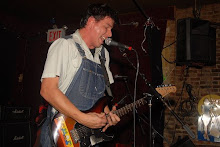Let's have some sounds resplendent with hope, positivity and the constructive interrelations of the elements that get involved!
Franz Haydn
Symphony No. 83
Wolfgang Mozart
Sinfonia Concertante, K.364
Orchestra Of The Age Of Enlightenment
Ivan Fischer, conductor
Rachel Podger (violin)
Pavlo Beznosiuk (viola)
Wednesday 21 May 2008
7.00-8.45pm
from a BBC RADIO 3 broadcast of the concert
Deft, vibrant beats from the Enlightenment crew make for a constantly rewarding experience. They have such a great name, too- fitting for the challenge around us.
A Haydn symphony to begin because, well, it's Haydn. All undertakings should perhaps begin with this sort of thing. Especially with a skewering of overly serious and drama-heavy approaches, as happens in the first movement. The initial theme, with its big knotted brow, and dark, intent stride gets turned onto the "poultry-like waddling of the second subject", as David Hurwitz described it.
Then, the usually period-obsessed violinist Rachel Podger, a personal favorite, is half the soloist team in the Mozart double concerto. Ever since her recording of the Bach Partitas and Sonatas, those pieces get competition in the listening cue, alongside recordings by Szeryng and Kremer (1980), some Grumiaux.
The slow movement of K.364 always holds the most interest for me; here the interweavings of viola and violin create a tapestry of mindful discussion with some really emotionally naked digging in.
Then, the finale! So dancy and bright, makes it all sound like just the beginning...
Mozart
K.364
"Sinfonia Concertante"
01 Allegro Maestoso
02 Andante
03 Presto
Haydn
Symphony No. 83
"Hen"
04 Allegro spiritoso ["Hens are like people, and their conflicts caricature our own"- the composer]
05 Andante
06 Menuetto allegretto/Trio
07 Finale: Vivace
Some notes from the BBC website regarding its broadcast:
"...The Orchestra of the Age of Enlightenment turn the clock back to Paris on the eve of the French Revolution, in the last concert in their acclaimed The Age of Revolution series, recorded [May 21st, 2008] at London's Queen Elizabeth Hall.
...Haydn...visited pre-revolution Paris in 1785 and his Hen Symphony was one of the six Paris Symphonies he composed for public concerts in the city.
...This is the Paris where vibrant new ideas clashed with the stasis of the Ancien Regime, where philosophers rubbed shoulders with Catholic priests and encyclopaedists with noblemen. Into this environment came a young Mozart, and it was here that he received the impetus to compose his Sinfonia Concertante for Violin and Viola..."
Allright then. On to it.
































